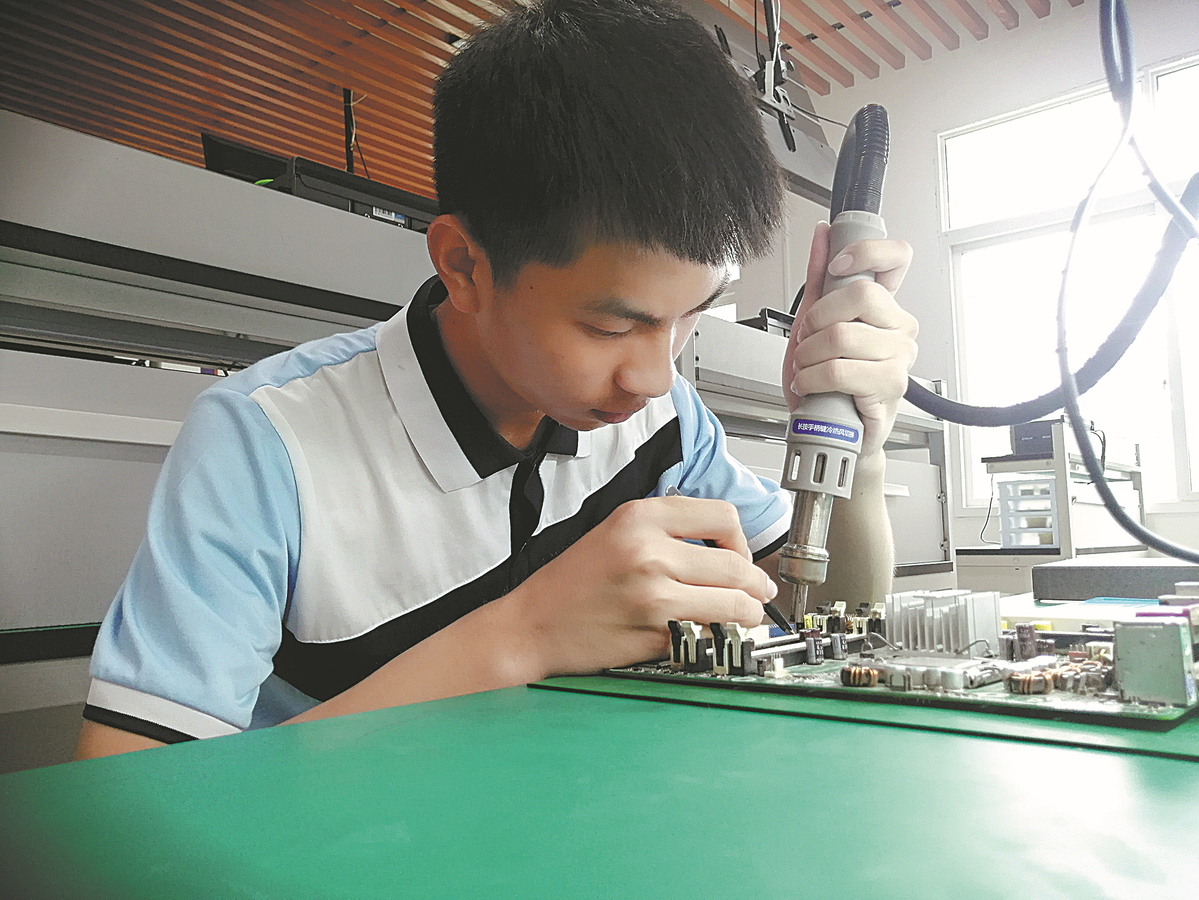Vocational majors on alternate path to success


As the saying goes, all roads lead to Rome.
As China attaches greater importance to vocational education based on students' abilities, more high-level blue-collar workers can receive good salaries and social recognition, embarking on the road to self-fulfillment.
In a class full of students majoring in 5G intelligent terminal maintenance at the Changshun County Secondary Vocational School in Guizhou province, students were carefully welding chips with soldering irons and heat guns. They could be future employees at tech giants such as Huawei and Xiaomi based on a school-enterprise cooperation program, and their monthly salaries could exceed 10,000 yuan ($1,542), according to the county government.
The school began offering the 5G major in June last year. It signed an agreement with leading companies in the communications industry to train students based on market demand. There are currently 198 students pursuing the major in four classes.
During the three-year study program, those who pass tests and perform well enough on interviews may participate in a three- to six-month-long training session at Huawei's maintenance center in Beijing as an intern, and those who do well there could be recruited after graduation, according to the school.
"We established the major to help increase employment and promote poverty alleviation through education, and we thought the investment was very worthwhile," said Qi Liangliang, deputy head of Changshun county, adding he hoped the students could contribute to the development of the big data industry, a pillar in Guizhou.
Ye Wenjie, 17, was one of the first students to be enrolled in the major.
"I was not sure what I wanted to do in the future before I came here," he said.
A naughty boy keen on disassembling telephones as a child, Ye now finds himself on the right track to become an electronic communication engineer.
Ye said he has learned how different components of a phone work and how to judge their quality. He is capable of taking them apart and reassembling them correctly. He also acquired knowledge about computers, communications networks and professional ethics.
Last month, together with 52 classmates, Ye went to Huawei's maintenance factory for training.
"At first, my hands trembled while holding the heat gun. After repeated attempts, I succeeded," he said. "I want to be employed by a renowned and reputable company and, if possible, open my own maintenance store in the future. I want to live a better life and help my family be well-off, too."
Feng Xiaohai, principal of the school, said when the county was working to reduce poverty in 2019, the school sent teachers to visit local teenagers who had dropped out or had not found a job, and suggested they take the course.
"A well-trained teenager can be a future breadwinner for a poor family," Feng said. "Our effort moved many parents. Though the students may not perform well in academic studies, they can earn good wages if they can do manual work. The idea is not to give up on any student."
He added the tuition for the major is 1,510 yuan per year, and students get a living subsidy of 2,000 yuan annually from the government. Boarding is free, with bedding provided by the school. Students from poor families can receive a discount of 610 yuan on their tuition and receive a higher subsidy of 3,000 yuan per year.
Feng said most students trained in Beijing have made significant progress in their maintenance skills and are earning enough to feed a family. Some interns have received a monthly salary of 4,300 yuan.
The 5G intelligent terminal maintenance major is also part of the cooperation between the vocational school and the Beijing University of Posts and Telecommunications, which donated 2 million yuan to build modern training rooms for the school. The university also designed textbooks and trained teachers for the school.
With about 3,000 students, the vocational school also offers majors in numerical control and application, hairdressing, image design, auto repair and nursing, and is cooperating with auto maintenance and mechanical processing companies, as well as hospitals.
"The key to deepening the integration of vocational education and industry is to match demand and supply, exchange resources and share benefits," Feng said.
"As China has made remarkable achievements in poverty reduction, our country has also seen drastic changes. The next step is to promote rural vitalization and educate the youth to play a key role in that."
Bai Huarun, who comes from a poor family, graduated from the school in 2015. She is now a nurse at the emergency center of Changshun County People's Hospital, earning a monthly salary of about 4,000 yuan.
Bai, 26, said the school arranged for students to be interns at the hospital for a year, and she passed the tests to become an employee. She later married a doctor at the hospital. They bought a house in the county and now have a child.
"I'm quite satisfied," she said. "Before, I had no plans for my future. The school taught me practical skills and a sense of responsibility. Knowledge can change lives."
China has underscored the importance of accelerating the development of a modern vocational education system, training more high-caliber technical professionals and lifting their social statuses by offering more policy support and investment as the country moves toward socialist modernization, according to a national conference on vocational education in Beijing in April.
Zhao Yandi in Guiyang contributed to this story.
- Green transition key for agri-food sector
- Qingdao West Coast New Area launches major investment drive in Beijing
- 4.9-magnitude quake hits China's Xinjiang: CENC
- Ex-Hebei official sentenced to 18 years for bribery
- China intensifies emergency food supply amid increasing extreme weather events
- Young artist transforms Tibetan village with 3D murals





































